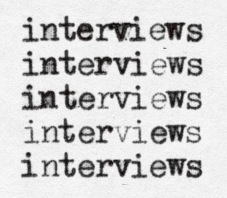Interviews: how to handle requests for questions in advance
 “What should I do if an interviewee wants to see a list of questions before the interview?”
“What should I do if an interviewee wants to see a list of questions before the interview?”
This is a question that comes up many times in journalism training courses.
Journalists around the world are often faced with the situation where a person they want to interview asks, or even demands, to see a written list of the questions before the interview can take place. It’s also a common request from pushy public relations consultants or the press staff of politicians.
Even journalists just starting out in their career instinctively know this isn’t a good idea. But they and more experienced journalists often lack strong arguments to convince potential guests to do an interview without seeing the questions first.
So, after having talked the issue over with lots of different participants in many training courses, here’s a summary of some of the discussions.
First, we’ll look at why it’s a bad idea to hand over questions. Then, we’ll talk about how to convince your guest to go into an interview without the list of questions they wanted.
Why it’s a bad idea
The main reason handing over a list of questions is a bad idea is that it puts the journalist in a bit of straitjacket. If the interviewee says something interesting you may want to ask follow up questions or totally new questions.
The last thing you want is an interviewee saying, “But that’s not on the list of questions,” and refusing to answer.
Moreover, in certain interviews you may want an element of surprise. For example, if you are going to interview someone about a corruption scandal you might not want them to know exactly how much you know before the interview. Seeing how they react when you present them with certain information for the first time can not only help you assess whether they are telling the truth it can also make for some powerful moments on tape.
There is another more practical reason, however, why handing over a full list of questions isn’t a good idea. The problem is that some people will prepare their answers so thoroughly that their responses will no longer sound natural. If the interview is being recorded this sounds terrible. Audiences will switch off automatically. A prepared statement is not as easy to listen to as a normal conversation. (This can often be a problem when interviewing experts on technical subjects.)
How to “sweet talk” your guests
So how to get around the demand? The first thing to say is that you can, and indeed should, tell the interviewee what the interview is going to be about beforehand.
You can perhaps tell them the main areas to be discussed, and even offer some examples of questions. This is only fair to the interviewee, as most people will want to prepare themselves, and it can mean you end up with a better interview.
But what if the person still wants a written list of all the questions? How to convince them to go ahead without one?
– Explain that giving a list of questions is not usual journalistic practice. Some interviewees may think they have a “right” to see the questions. Other interviewees are just very nervous. They may not have done many media interviews. If you explain how the process usually works this can calm them down.
– Explain that if they prepare their answers too much they will sound stilted and unnatural. Point out that the audience will understand answers better if they sound conversational.
– If it’s not going to be a confrontational interview, reassure the person. Build a relationship of trust. Make it clear you will help them through the interview. If they are still really nervous, and if the interview is not live, you can suggest they can stop and start their answers.
– In certain cases it may be appropriate to let your audience know the conditions the person imposed before the interview could go ahead. If you tell your interviewee that you are going to include a phrase like this in the story, they may decide not to impose conditions after all.
If all else fails?
So what to do if the potential interviewee just won’t be convinced and is still demanding a full list of questions?
Well the first thing to ask of course is, “Do I really need to interview this person?” Is there another person out there who won’t be so difficult and might provide a better interview?
If the interview has to happen, and has to happen with this person, then you’ll have to give in. Journalists can’t force people to be interviewed after all.
One final tip though:
Once the interview has started, and especially if it’s being recorded, try to ask some questions that aren’t on the list (unless you have explicitly promised to stick to the list.) Some people may loosen up a bit once the tape is running.
Have you encountered interviewees demanding questions in advance? What happened? How did you get around it? Lets us know in comments below or on our Facebook page.
Author: Martin Vogl




Feedback